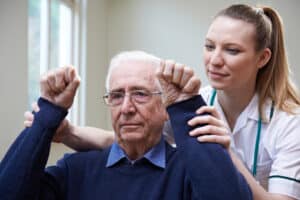
Strokes are a common non-traumatic cause of acquired brain injuries. When someone has a stroke, there is a blockage in the large blood vessels of the neck. This can happen because of a blood clot, hardening of the arteries, or other reasons. This blockage prevents adequate blood flow to the brain, so the brain goes without the oxygen-rich blood it needs.
A stroke can cause damage to diffuse areas of the brain, causing serious impairments. A stroke acquired brain injury (ABI) can be deadly if emergency medical attention and life-saving care aren’t received immediately.
Strokes May Lead to Significant Impairments
When your brain cannot get the oxygenated blood it needs, damage begins to occur almost immediately. Within minutes, neural cells die and the affected areas sustain damage. Every minute this goes on means more damage.
If someone suffers a massive stroke and does not get emergency medical care within a few minutes, they may not survive. If they do, lasting physical and cognitive impairments are common. First responders can often administer medication to help get the blood flowing properly again. This may be able to save the patient’s life, but a significant ABI and some lasting impairment are still common.
An ABI Affects Stroke Victims in Many Different Ways
Like other brain injuries, the ABIs suffered by stroke victims vary widely. Strokes can affect almost any area of the brain, in different ways, and to different degrees. Only a doctor familiar with your loved one’s condition can address their prognosis.
A stroke acquired brain injury can cause many symptoms. Some are lasting, but many disappear with time. Therapy and rehabilitation often help.
Common symptoms of a stroke and ABI include:
- Loss of consciousness
- Impairments related to mobility and dexterity, often on one side of the body
- Loss of skills, including basic self-care
- Loss of speech, or trouble finding the right words
- Disorientation and confusion
- Poor concentration and focus
- Dramatically slowed response times
- Loss of short-term memory and other memory complaints
- Severe fatigue, difficulty staying awake, and/or other sleep disorders
- Dizziness and balance issues
- Lack of coordination
- Headaches
- Double vision
- Loss of sense of smell
- Deafness or ringing in the ears
- Emotional and behavioral changes and drastic changes in personality
- Epilepsy and seizures
Treatment and Rehabilitation After a Stroke and ABI
Strokes can be so mild the person does not initially notice or so severe they pass away almost instantly. The brain injuries that accompany them are much the same way. Some people recover fully in a few weeks while others never recover enough to live independently. Many seniors who suffer strokes require at least some therapy or rehabilitation. This allows them to rebuild strength, learn lost skills, and adapt to any lasting impairments.
Even after a relatively minor stroke, your loved one’s doctor may recommend:
- Physical therapy
- Cognitive therapy
- Occupational therapy
- Speech therapy
In cases where the brain injury is more severe, the doctor may prescribe inpatient rehabilitation. This allows the patient to attend therapy all day and practice their new skills under supervision. Inpatient rehabilitation focuses on regaining skills that allow for independence, mobility, and self-care.
These skills are key to ensuring the patient can live independently. If the damage is so severe this is not possible, then they may require long-term and ongoing care. The family may need to consider a nursing home, in-home care, or other options.
Strokes and Civil Suits for Compensation
Most strokes are medical issues that do not support a negligence lawsuit, but there are some situations where an action for negligence is possible. When doctors fail to prevent or treat a stroke, when they miss the diagnosis, or when other mistakes occur, your loved one may suffer avoidable brain injuries.
For example, imagine your family member went to the local emergency room complaining of numbness and weakness on their left side, along with slurred speech. If the doctor on duty sent them home without suspecting a stroke and taking preventative action, the hospital and that doctor could be liable for their ABI.
If your loved one suffered a stroke that resulted in an ABI, the personal injury team from Newsome | Melton will review your case and determine if medical negligence played a role. With more than two decades of experience aggressively pursuing payouts for families like yours, you can trust our brain injury lawyers to go after the damages you deserve.
Call us today to learn more: (800) 917-5888.
